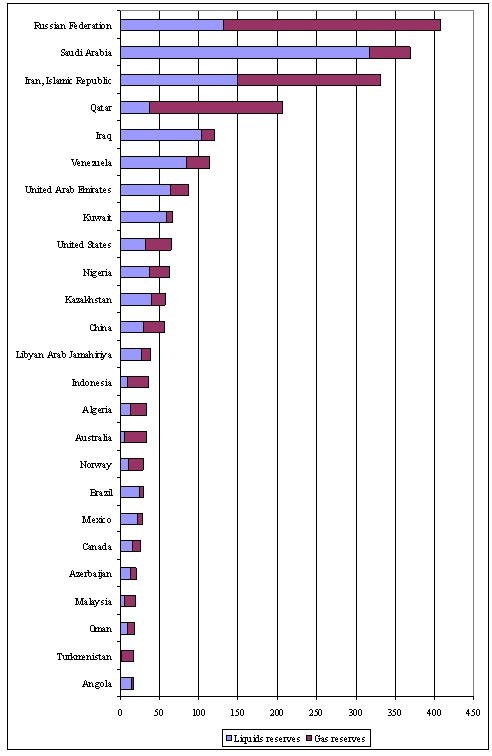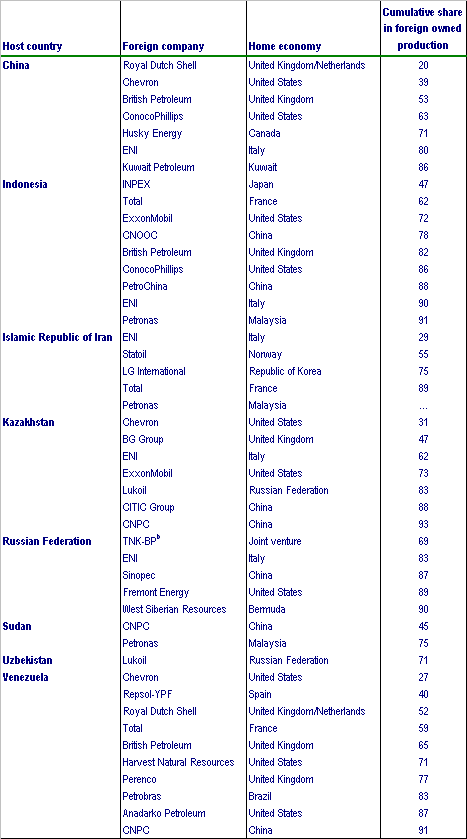Oil and gas conglomerates from industrialized countries are finding that their room for overseas manoeuvre in the oil and gas industry is shrinking, UNCTAD reports. With crude oil prices staying well above US$70 a barrel, such traditional transnational corporations (TNCs) are losing bargaining power to oil-producing countries eager to use climbing demand to capture a larger share of the rents. Traditional TNCs are also facing new competition in the form of TNCs from the South.
Remaining reserves are mainly found outside the developed world
There are large imbalances in world consumption, production, and reserves of oil and gas. Although demand has grown particularly fast in selected Asian economies in recent years, developed countries still consume more than half of global oil and gas output, while they account for only a quarter of production. Moreover, less than 8% of the world´s remaining proved reserves of oil and gas are found in these countries. As many as 21 of the top 25 countries ranked in 2005 by total remaining proved reserves were developing or transition economies (see figure 1).
In addition, a comparison of data on production and reserves suggests that resources in developed countries are being depleted at an average rate more than ten times faster than that of developing and transition economies. That means industrialized countries will have to rely increasingly on oil and gas imported from developing and transition economies.
Narrowing space for developed-country TNCs
For developed-country TNCs, accessing remaining reserves is becoming increasingly complex. Some developing countries with large reserves - such as Kuwait, Mexico, and Saudi Arabia - do not allow foreign participation in oil and gas extraction. Others permit foreign investment but are facing embargoes applied by TNCs´ home countries. For example, companies from the United States are not allowed to invest in the Islamic Republic of Iran or in Sudan.
In addition, several oil and gas producing countries have recently adopted measures to restrict the participation of TNCs in extraction or to redistribute the revenues derived from such activities.
- In Bolivia a 2006 Hydrocarbon Law transferred control over resources to the State and laid the basis for negotiating higher tax and royalty rates with investors.
- In the Russian Federation, according to a new "subsoil law" expected to enter into force in late 2007, foreign investors and Russian companies which are 50% or more owned by foreigners will not be allowed to bid in auctions for strategic deposits. Since 2003, the Russian government has also renegotiated the terms of almost all TNC-related oil and gas contracts, resulting in an increase in the government´s share of revenues and in higher taxes and royalties.
- In Venezuela, the government has changed the rules on equity participation and taxation to reduce foreign oil and gas company interests and to raise government revenue from the sector.
Competition for oil and gas resources is further accentuated by the entry of new competitors headquartered in developing and transition economies. CNOOC, CNPC, Sinopec (all from China), Kuwait Petroleum (Kuwait), Lukoil (Russian Federation), Petrobras (Brazil) and Petronas (Malaysia) are already among the main foreign investors in selected oil and gas producing countries. They now operate alongside traditional TNCs from developed countries (see table 1). The technological and managerial capabilities of the new TNCs are improving rapidly.
"We are witnessing the emergence of a more varied and complex commodity economy, which is raising a number of issues - not the least of them pertaining to South-South relations", UNCTAD Secretary-General Supachai Panitchpakdi commented recently.
A more detailed assessment of the development and policy implications of the evolving role of TNCs in the extractive industries will be provided by UNCTAD´s World Investment Report 2007, to be released on 16 October 2007.
ANNEX
Tables and figures
Figure 1. Oil and gas reserves, top 25 economies, ranked by total remaining proved reserves, 2005 (Billion barrels of oil and oil equivalent)
Source: UNCTAD, base on data provided by IHS
Table 1. Largest foreign oil and gas companies operating in selected developing economies, 2005 (Cumulative per cent share in local production)
Source: UNCTAD, base on data provided by IHS
Note:a Bunduq Oil is a consortium of the United Petroleum Development Company of Japan (33.3%), Total (33.3%) and British Petroleum (33.3%)
b TNK-BP is a 50-50 joint venture between British Petroleum and Access/Renova and Alfa Group (Russian Federation).


